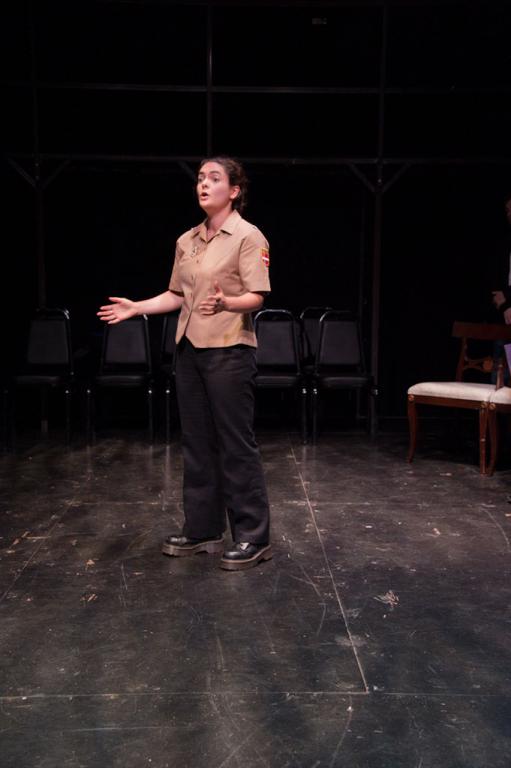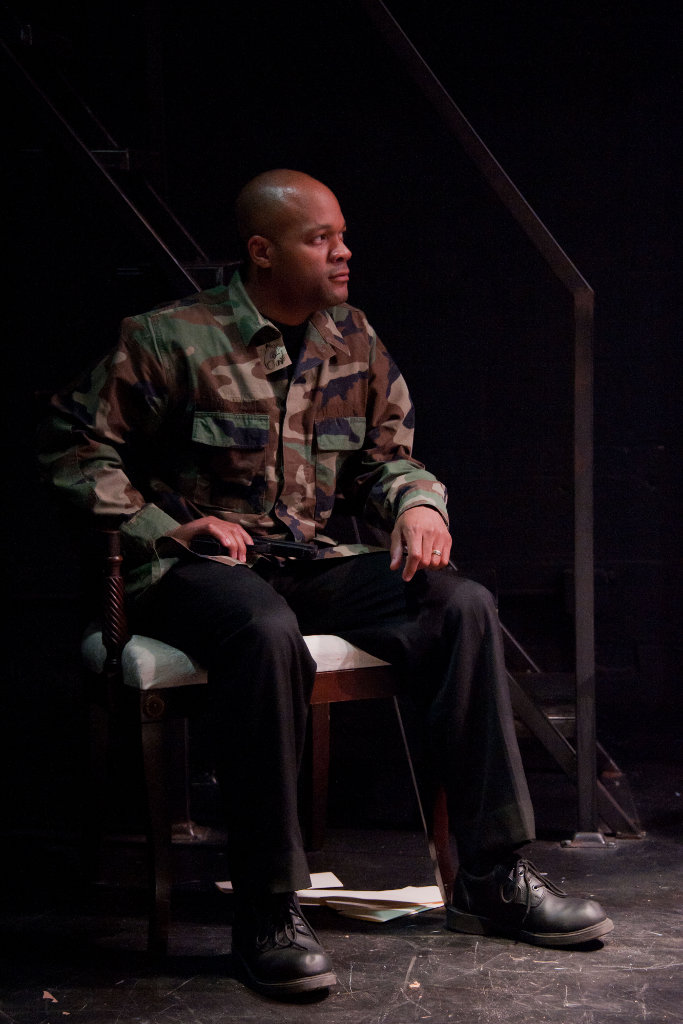
The text of Hamlet does not provide a wealth of information on what kind of king or person Hamlet's father (Hamlet Sr) was. Additionally, we are so used to seeing the story from Hamlet's point of view that we end up with a potentially skewed perception of the old king. Shakespeare doesn't give us much to go on, and in our reframing we hear even less about him. What Shakespeare has given us is a rich political environment of a country in the midst of a change in leadership, resulting in a massive policy upheaval.
This is the background fundamental to our production, recognizable to the modern American audience. The US government experienced this sort of revision from Clinton to Bush, and again from Bush to Obama (ignoring the months of campaigning or public elections). In looking at these changes and heeding what little is said (by people other than Hamlet), we can piece together a picture of the late king.
That warlike form


We see the old king only as a ghost (and in our production not at all). He enters in full armor, and likely fully armed. He was a war-king. The first description of the ghost by the watch is:
that . . . warlike form
In which the majesty of buried Denmark
Did sometimes march (I.i)
then,
Such was the very armour he had on
When he the ambitious Norway combated;
So frown'd he once, when, in an angry parle,
He smote the sledded Polacks on the ice. (I.i)
and later to Hamlet,
Armed at point exactly, cap-a-pe [head to toe] (I.ii)
These lines indicate that Hamlet Sr is remembered in armor. He was not a decadent king, wearing jewelry, nor a pious king, wearing priest-like robes. He was a war king, looking for battle. What is more revealing in these lines is the mention of Hamlet Sr's wars with Norway and Poland. The only other country mentioned in the entire text is England, where Hamlet Jr is sent to die:
And, England, if my love thou hold'st at aught--
As my great power thereof may give thee sense,
Since yet thy cicatrice looks raw and red
After the Danish sword, and thy free awe
Pays homage to us--thou mayst not coldly set
Our sovereign process; which imports at full,
By letters congruing to that effect,
The present death of Hamlet. (IV.iii)
So the Danes had also conquered England, with different results. In Norway, Prince Fortinbras' armies are preparing for retribution. Poland gets invaded by Norway with Danish consent. England, instead, we can envision as a Danish colony or protectorate. They are still licking their wounds from the last time they fought Denmark, and are likely an occupied nation, perhaps a puppet government. None of these victories could have happened on Claudius' watch - he is far too busy tending to domestic affairs to be an international aggressor, and has only been king for a few months. They must have happened all during Hamlet Sr's reign, and must have marked the legacy of his regime.
What's more, we also know that Hamlet Sr was reckless in his war-mongering. A report by Cornelius in our production (originally exposition in I.i) tells the story of Denmark and Norway:

Cornelius (Allison S. Galen) reports
Our last king [Hamlet Sr]
Was, as you know, by Fortinbras of Norway,
Thereto prick'd on by a most emulate pride,
Dared to the combat; in which our valiant Hamlet--
For so this side of our known world esteem'd him--
Did slay this Fortinbras; who by a seal'd compact,
Well ratified by law and heraldry,
Did forfeit, with his life, all those his lands
Which he stood seized of, to the conqueror:
Against the which, a moiety competent
Was gaged by our king; which had return'd
To the inheritance of Fortinbras,
Had he been vanquisher; as, by the same covenant,
And carriage of the article design'd,
His fell to Hamlet.
Hamlet Sr wagered his entire nation on a duel with Fortinbras Sr, then king of Norway, and there was no one who could (or would) stop him. This must have created some ill will between the Danish court and the king. (In the world of Hamlet: Reframed, it is the beginning of the rift between Gertrude and Hamlet Sr.) On the other hand, a strong military and Hamlet Sr's erratic behavior served as a deterrent to potentially aggressive enemies, and no doubt kept Denmark relatively safe. No one was willing to attack the nation while Hamlet Sr was alive.
Mark Addy as Hamlet Sr?
In Hamlet: Reframed, we take this one step farther. Our Hamlet Sr cared little for anything other than fighting and drinking. (Mark Addy's performance as King Robert on Game of Thrones encapsulates him pretty well.) This inevitably led to mismanagement: overspending both monetary and human resources on military left the rest of the nation dry. We imagine a Denmark with a failing infrastructure, poor schools, a deregulated financial sector, and neither the money nor the people to fix them. Claudius murders him (in his sleep; not by outright duel, of course) out of patriotism, rather than greed or lust. The country he loves is failing, and he thinks he can do better - he can't really do much worse, right?
Unfortunately, Hamlet Sr had been keeping foreign enemies at bay. Perhaps Claudius underestimated the degree to which other countries would seize on Denmark's perceived new weakness and test the new regime. Perhaps he weighed the pros and cons, and took the risk. Regardless, as soon as the news of his death reached Norway, young Fortinbras turned his military sights on Denmark - revenge for the death of his father all those years ago. This is where the play begins.
Regime change

Claudius (John Stange)
is good at diplomacy
Claudius is everything his brother was not: intelligent, diplomatic, a non-fighter. While Hamlet Sr's philosophy was that 'the best defense is to maul your enemies so that they never think of attacking you,' Claudius tries a non-aggressive two-pronged approach. The first is to build military defenses to physically stop an invading force. (Hamlet Sr's spending had been entirely offensive.) At the same time, he sends ambassadors to Norway to negotiate with the king, Fortinbras' uncle, and attempt a bloodless resolution to the campaign.
The diplomatic approach provoked the Norwegian king to slap the hand of young Fortinbras, but he nevertheless
Gives him three thousand crowns in annual fee,
And his commission to employ those soldiers,
So levied as before, against the Polack. (II.ii)

Young Fortinbras
(Christopher C. Holbert)
What's more, the Norwegians request safe passage through Denmark on their way to and from Poland.
Many snippets of the text indicate that Fortinbras does not change his original intent, but hides it behind the thin veil of this diplomatic agreement. First of all, the point of attack in Poland is an frontier town with no military or financial value, far from the heart of the Polish empire.
[They] go to gain a little patch of ground
That hath in it no profit but the name.
To pay five ducats, five, I would not farm it;
Nor will it yield to Norway or the Pole
A ranker rate, should it be sold in fee. (IV.iv)
This is not an invasion of Poland. This is a raid, but with a two thousand troop "army of such mass and charge," (IV.iv) plenty enough to assail Elsinore on their way home.
That their passage through Denmark takes them anywhere near Elsinore is also cause for Danish concern. This may be another example of Shakespeare's lack of geographical knowledge (Proteus takes a boat in Two Gentlemen of Verona from Verona to Milan, two land-locked cities). However, in Hamlet: Reframed, we have chosen to use the true geography to inform the Norwegian campaign.

Denmark at Shakespeare's writing of Hamlet
Elsinore is located on the island of Zealand. To march past, the Norwegian army must sail to the island, get off the boat, walk by the castle, get on another boat, and sail away, a waste of resources if it were without purpose. We might see the Norwegian reasoning in two ways. First, Fortinbras might merely be flexing his military muscle by walking through Denmark. (Henry V attempted such a march through France in 1415, ending with the surprising English victory at the Battle of Agincourt.) Or he could be there to conquer. All the evidence in the text points to the latter, but the success of either would certainly mark the end of the savage and powerful reputation that King Hamlet earned for his country.
